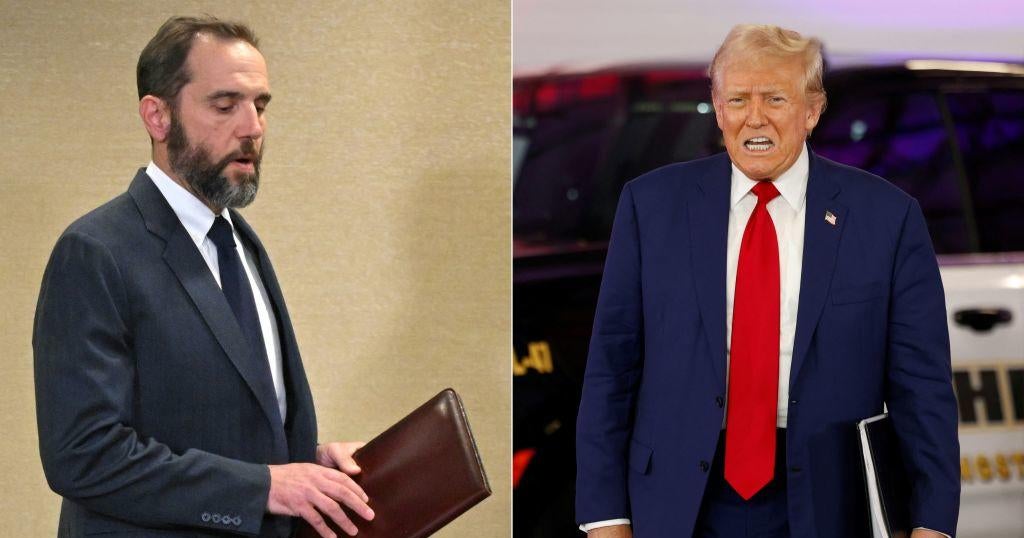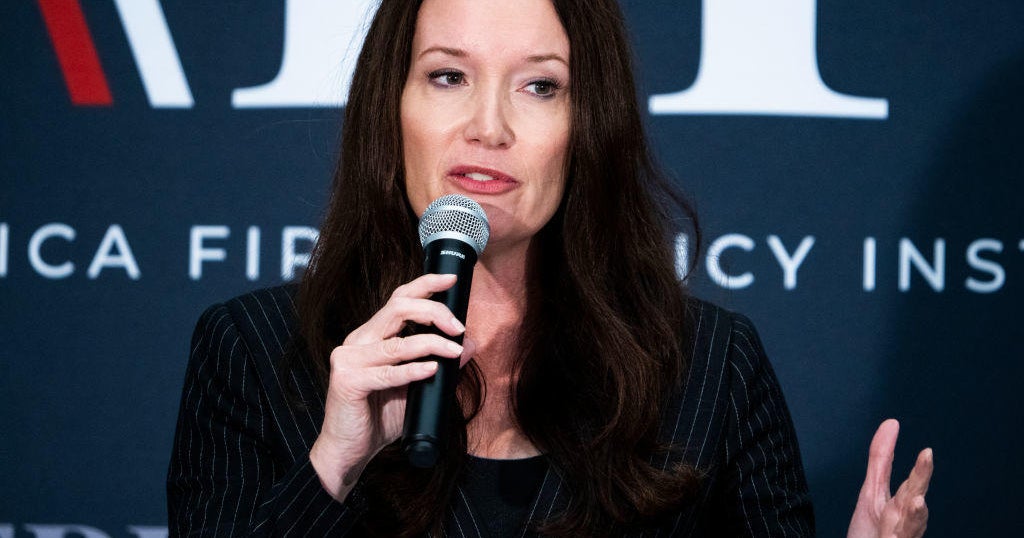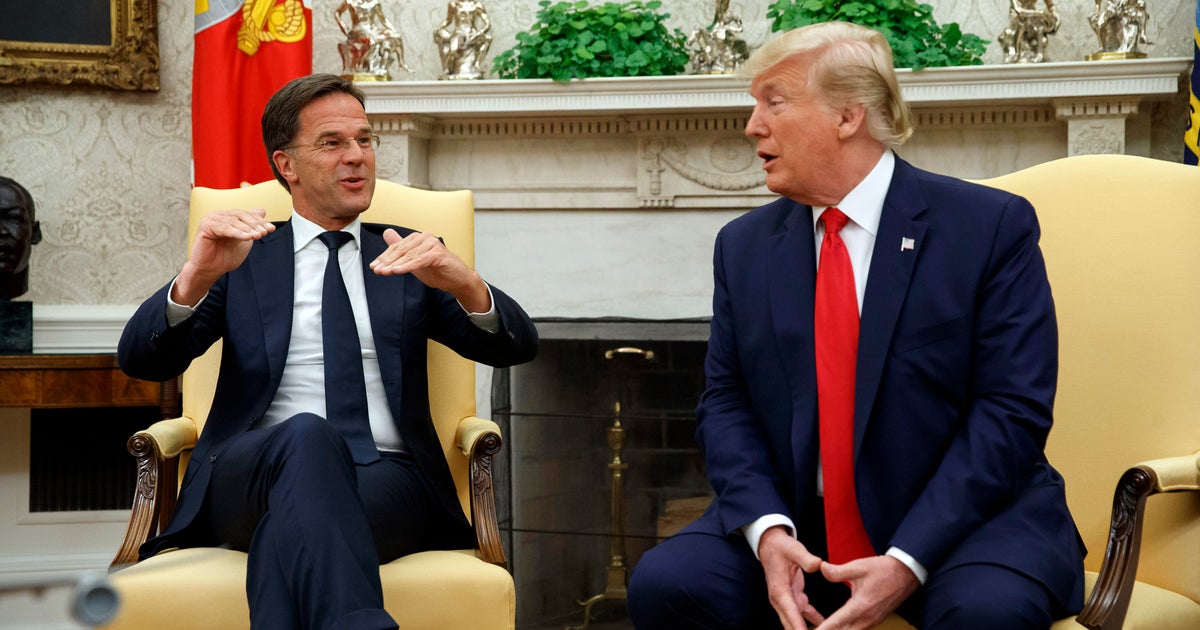CBS News
Trump, special counsel lay out opposing plans for way forward in federal 2020 election case

Washington — Federal prosecutors and attorneys for former President Donald Trump presented opposing arguments for how special counsel Jack Smith’s 2020 election-related case against Trump will move forward, according to court documents filed late Friday.
“The parties recognize the types of motions and briefing anticipated in pre-trial proceedings but have differing views on how the Court should schedule these matters and the manner in which they are to be conducted,” the joint filing said.
Smith argued the court should “first and foremost” make rulings tied to issues of presidential immunity as outlined by the Supreme Court, indicating the court should move forward with the case.
“The Government proposes that it file an opening brief in which it will explain why the immunity set forth in Trump does not apply to the categories of allegations in the superseding indictment or additional unpled categories of evidence that the Government intends to introduce at trial and will proffer in its brief,” prosecutors wrote.
Meanwhile, the former president’s legal team urged the court to give the parties more time to go over the potential legal questions and proposed a schedule that would bring the case into the spring or fall of 2025, about two years after the charges were first filed.
“President Trump holds the right to challenge the new indictment, and the underlying grand jury process, as a matter of law,” his team wrote, adding later, “We believe, and expect to demonstrate, that this case must end as a matter of law.”
The filing responds to U.S. District Court Judge Tanya Chutkan’s request for proposals from each side about how to proceed in the wake of July’s Supreme Court decision that granted Trump some presidential immunity from criminal prosecution.
The high court’s conservative majority ruled presidents and former presidents are immune from criminal prosecution for “official acts” they take during their presidency.
Some of the conduct alleged in Smith’s original indictment, such as Trump’s discussions with the Justice Department in the aftermath of the 2020 presidential election, was explicitly disqualified from the charges, according to the July opinion written by Chief Justice John Roberts. But other conduct, including interactions with campaign officials and private attorneys, could be examined.
It is now up to Chutkan to decide how to apply the Supreme Court’s ruling to the charges against Trump. But before she could weigh in, Smith secured a superseding indictment against the former president on Tuesday, in which prosecutors removed the alleged conduct deemed by Roberts to be covered by presidential immunity.
Trump still faces the same four federal counts — including conspiracy to defraud the U.S. — in a charging document that describes an alleged plot to subvert the results of the 2020 presidential election. Trump pleaded not guilty to the original 2023 indictment and has continued to deny any wrongdoing.
The new 36-page charging document is based on a more refined set of allegedly criminal acts, and prosecutors wrote it “reflects the government’s efforts to respect and implement the Supreme Court’s holdings.” Much of the conduct alleged in that first indictment remains in the new one, with notable exceptions, including the former president’s work with Justice Department officials and consultation with White House officials leading up to the Jan. 6, 2021, Capitol attack.
Friday’s filing revealed Trump’s team intends to file additional motions to dismiss the new indictment based on claims that the former president remains immune from prosecution on portions of the conduct included in Smith’s latest indictment, including social media posts, public statements, communications with state officials and interactions with former Vice President Mike Pence. Chutkan has already denied a few of Trump’s requests to dismiss the case.
“The Special Counsel’s inability to rebut the presumption as to Pence is dispositive to this case. The special counsel will be unable to do so as a matter of law, thus rendering the remainder of the case moot,” Trump’s team wrote, seizing on Jack Smith’s decision to include the conduct related to the then-vice president in the new charging documents after the Supreme Court ruled those actions were “presumptively immune” from prosecution, but open to rebuttal.
Prosecutors are likely to argue they tailored the superseding indictment to comply with the Supreme Court’s ruling, so no further immunity should be conferred. They said they will seek to, “distinguish [Trump’s] private electioneering activity from official action, and rebut the presumption of immunity as to any conduct that the Court may deem official,” according to the new court filing.
Chutkan will now have to decide how to move the case forward in light of the Supreme Court’s decision and the new superseding indictment against Trump. A hearing is currently set for Sept. 5 in Washington, D.C., but Trump is not required to attend.
Notably, the former president’s legal team also wrote they intend to file motions to challenge the legality of Smith’s appointment and funding, a legal strategy that is likely to mirror that which they employed in the special counsel’s second federal case against Trump. U.S. District Judge Aileen Cannon of Florida — who oversaw the classified documents case — decided in Trump’s favor last month when she ruled the special counsel’s appointment was invalid.
Smith has defended his appointment, and this week urged an appeals court to resurrect the case, writing Cannon’s ruling “took inadequate account” of history and arguing decades of legal precedent supported his appointment.
In an attempt to keep the proceedings moving forward, prosecutors proposed a schedule that would allow Chutkan to consider various legal issues on “parallel” tracks.
CBS News
How to watch the Tampa Bay Buccaneers vs. New York Giants NFL game today: Livestream options, more

Kevin Sabitus/Getty Images
MetLife Stadium in New Jersey is set to host a game between the Tampa Bay Buccaneers and the New York Giants today. Both teams have lost more games than they’ve won so far this season. The Buccaneers enter the game looking to end a four-game losing streak. Overall, they’re just 4-6 while the Giants are 2-8, having lost five consecutive games.
Keep reading to find out how and when to watch the Tampa Bay Buccaneers vs. New York Giants game today, even without cable.
CBS, Paramount+ and CBS Essentials are all subsidiaries of Paramount Global.
How and when to watch the Tampa Bay Buccaneers vs. New York Giants game today
The Tampa Bay Buccaneers vs. New York Giants game will be played on Sunday, November 24, 2024 at 1:00 p.m. ET (10:00 a.m. PT). The NFL game will be televised on CBS. It can also be streamed on Paramount+ and the platforms noted below.
How and when to watch the Tampa Bay Buccaneers vs. New York Giants game without cable
While CBS is available with many basic cable packages, you’ll have other viewing options, too for the big game. Just note that the below streaming options will require the use of an internet provider:
Paramount+: Watch CBS-aired NFL games without cable
With Paramount+ you’ll have multiple viewing options to choose from. You can catch NFL games on the Paramount+ Essential tier for just $7.99 each month or you can watch college football with a Paramount+ with Showtime subscription for $12.99 monthly. In addition to live streams of NFL games airing on CBS, you’ll get to watch additional live sporting events including NCAA college football, PGA Tour golf, soccer and more.
Get started with Paramount+ here today.
Amazon Prime Video: Add Paramount+ to your existing subscription
Already have an Amazon Prime Video account? Then you can simply add Paramount+ to your current subscription to watch all the CBS-aired NFL games in addition to Paramount+ originals. The same prices from above apply, depending on which tier you choose. Not sure which is best for you? Don’t worry. Both options come with a free seven-day trial that can help you decide.
Watch the Buccaneers-Giants game on Amazon Prime Video.
Fubo: Watch the Buccaneers-Giants game for free
Looking for an inexpensive way to watch football? Fubo could be the best way to do so. The live TV streamer is currently offering a seven-day free trial and $30 off of your first month’s subscription. Once subscribed, you’ll gain access to all of their live sporting events immediately. And there will be a lot to choose from. Not only does Fubo come with access to NFL games airing on your local CBS channel, it also includes Fox Sunday NFC games, “Sunday Night Football” on NBC, “Monday Night Football” on ABC and ESPN and all of the games that air on the NFL Network. So don’t wait.
Get started with Fubo online now.
CBS News
How to watch the Kansas City Chiefs vs. Carolina Panthers NFL game today: Livestream options, more

Timothy T Ludwig/Getty Images
It will be the Kansas City Chiefs up against the Carolina Panthers in an NFL game today set for the Bank of America Stadium in Charlotte, North Carolina. Attention will be focused on the Chiefs, who are coming off their first loss this season, a 30-21 loss to the Buffalo Bills on November 17. That loss snapped a nine-game winning streak. The Panthers, meanwhile, are just 3-7 so far in the season but are coming off of wins against the New Orleans Saints and New York Giants, respectively.
Keep reading to find out how and when to watch the Kansas City Chiefs vs. Carolina Panthers game today, even without cable.
CBS, Paramount+ and CBS Essentials are all subsidiaries of Paramount Global.
How and when to watch the Kansas City Chiefs vs. Carolina Panthers game today
The Kansas City Chiefs-Carolina Panthers game will be played on Sunday, November 24, 2024 at 1:00 p.m. ET (10:00 a.m. PT). The NFL game will be televised on CBS. It can also be watched via streaming on Paramount+ and the platforms noted below.
How and when to watch the Kansas City Chiefs vs. Carolina Panthers game without cable
While CBS is available with many basic cable packages, you’ll have other viewing options to explore as well (just note that the below streaming options will require the use of an internet provider).
Paramount+: Watch CBS-aired NFL games without cable
With Paramount+ you’ll have multiple viewing options to explore. You can catch NFL games on the Paramount+ Essential tier for just $7.99 each month or you can watch college football with a Paramount+ with Showtime subscription for $12.99 monthly. In addition to live streams of NFL games airing on CBS, you’ll get to watch additional live sporting events including NCAA college football, PGA Tour golf, soccer and more.
Get started with Paramount+ here today.
Amazon Prime Video: Add Paramount+ to your existing subscription
Already have an Amazon Prime Video account? Then you can simply add Paramount+ to your current subscription to watch all the CBS-aired NFL games in addition to Paramount+ originals. The same prices from above apply, depending on which tier you choose. Not sure which is best for you? Don’t worry. Both options come with a free seven-day trial that can help you decide.
Watch the Buccaneers-Giants game on Amazon Prime Video.
Fubo: Watch the Chiefs-Panthers game for free
Looking for an inexpensive way to watch football? Fubo could be your best bet. The live TV streamer is currently offering a seven-day free trial and $30 off of your first month’s subscription. Once subscribed, you’ll gain access to all of their live sporting events immediately. And there will be a lot to choose from. Not only does Fubo come with access to NFL games airing on your local CBS channel, it also includes Fox Sunday NFC games, “Sunday Night Football” on NBC, “Monday Night Football” on ABC and ESPN and all of the games that air on the NFL Network. So don’t wait.
Get started with Fubo online now.
CBS News
How to watch the Philadelphia Eagles vs. Los Angeles Rams NFL game today: Livestream options, more

Getty Images
The Philadelphia Eagles look to extend a six-game winning streak to seven today when they take on the Los Angeles Rams at SoFi Stadium in Inglewood, California. The Eagles, who are 8-2 so far this season, are coming off a November 14 win against the Washington Commanders. The Rams, with a record of 5-5, are coming off a November 17 win against the New England Patriots.
Keep reading to find out how to watch the Eagles vs. Rams game today, even without cable.
How and when to watch the Philadelphia Eagles vs. Los Angeles Rams game today
The Philadelphia Eagles vs. Los Angeles Rams game will be played on Sunday, November 24, 2024 at 8:20 p.m. ET (5:20 p.m. ET). The game will stream on Peacock but it can also be viewed locally on NBC and the streaming platforms below.
How and when to watch the Philadelphia Eagles vs. Los Angeles Rams game without cable
While many viewers will be able to watch the game on regular NBC, you have alternatives, too. Just note that the below streaming options will require the use of an internet provider:
Peacock: Watch NBC-aired NFL games without cable
You can stream today’s game in addition to all NBC-aired NFL games and Sunday Night Football on NBC. Peacock subscribers can also watch original programming on the streamer as well as live content airing on NBC if you purchase a Peacock Premium Plus subscription. Plus, you’ll gain access to Peacock’s library of on-demand content. You can buy a one-year subscription to Peacock Premium (with ads) for $80. For $120 annually you can secure a one-year Peacock Premium Plus subscription which is mostly ad-free. Want to pay per month, instead? Peacock Premium is just $8 each month while Peacock Premium is $14.
NFL+: Watch Eagles vs. Rams live on your phone
Do you want to able to watch today’s game no matter where you’re located? Then check out NFL+. You can pay just $7 per month or $40 for the year. The network includes all games, including those being broadcast outside of your local market. You can also upgrade your subscription to NFL+ Premium with NFL RedZone. That will allow viewers to watch up to eight NFL games all at the same time.
Want to support your team? Fanatics is a great way to do so. With the latest player t-shirts, jerseys, hoodies and apparel, there’s plenty of stuff in stock to keep you covered this season. But don’t wait much longer. As each week in the season passes by, competition for this merchandise will increase. Act now before it sells out.
Head over to Fanatics now to check out the latest NFL fan gear drop.










